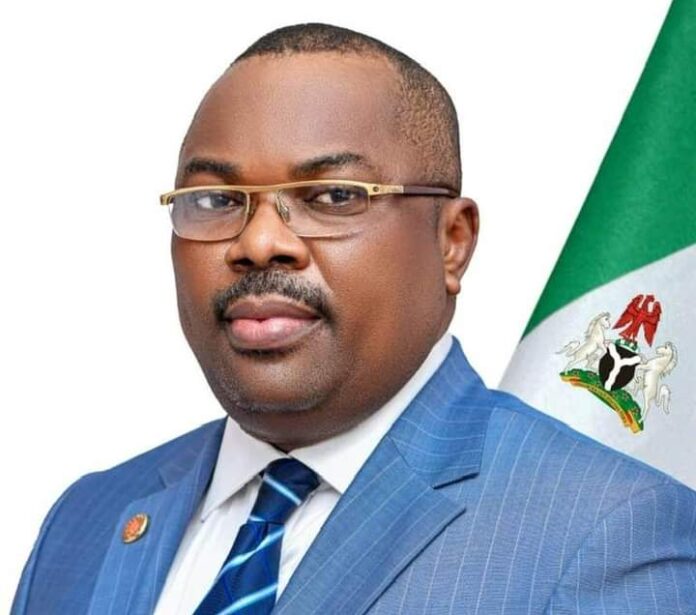Mr Linus Nkan, Commissioner for Finance, Akwa Ibom State.
Paradigm Leadership Support Initiative (PLSI) a front-lead civic organisation working around fiscal transparency and accountability released its 2023 Subnational Audit Efficacy (SAE) index, Akwa Ibom again ranked among top three states in the assessment supported by MacArthur Foundation. The 2023 SAE report presentation and award to states was held at the Shehu Musa Yar’Adua centre, Abuja, on Thursday 14th March 2024. In this interview, the Commissioner for Finance, Nsikan Nkan, PhD, FCTI, spoke with Managing Editor of The Dune, Abasifreke Effiong, on the SAE ranking and reforms in the financial sector in Akwa Ibom State. Excerpts:
What does the latest Subnational Audit Efficacy ranking by Paradigm Leadership Support Initiative mean to the state?
Paradigm Leadership Support Initiative (PLSI) released the 2023 audit report where all the states of the federation were subjected to their scrutiny and evaluation on audit efficacy,our state came among the top three . For us it was a decline, because in the 2022 assessment, Akwa Ibom state was number 1. However, we are excited about it and it’s a great testament to the effectiveness and efficiency we have achieved over the years in our public finance management. The rigorous process and screening done by the organisation captured almost all the areas in public financial management. We have no contest against their evaluation. Since we came onboard, we’ve brought lots of innovations, and effected reforms that have put our state on a very high pedestal when compared with others. Our position on the index is a result of the huge investment the state government has done to enhance the capacity of personnel that are involved in financial management in our state. It is also evidence of the quality of staff and personnel we have recruited to carry out the various tasks and assignments in the financial management of the state. The state government has invested in the training and re-training of our staff.
Today, the entire process of financial management is dominated by professional accountants. In Akwa Ibom state we have a good number of professional accountants certified by ICAN and ANAN handling the responsibility of recording, summarising, analysing and preparation of the various accounting records. So, for me this assessment and our standing doesn’t come by surprise. I know we are good and the records are there. When we talk about public financial management the origin is from the budgeting process and I’m glad to tell you that Akwa Ibom state has been adjudged one of the best in the country. In fact, our personnel in the budget office have been used to train other states at peer reviews organised by the Nigerian Governors’ Forum technical support to states. The technical team there has always commended our personnel and our budget has consistently been used as a template for adoption for training other states. I am glad to say that we have the right people doing a great job from budgeting – that’s the beginning in public financial administration From the budgeting, we move to budget execution. This is the stage where actual expenditures are made on budget items that we approved. At the various levels of execution, the mechanism to ensure transparency and accountability are enshrined throughout the system. We have financial regulation that prescribes the various approval limits for officers of government, from the Governor, the FGPC, MDAs. With this in place, every approval and expenditure is within allowable limits of each authority. After that, at the stage of release of approved funds by the Accountant General, we ensure that the bookkeeping capturing all the financial activities and transactions of the state are carried out meticulously as prescribed by the regulation. The Accountant prepares the final account called financial statement from the summary of this record for audit. After the audit, the Auditor General pushes the audit report to the House of Assembly where the Committee on Public Accounts will have to scrutinise side-by-side with all supporting documents before the account is recommended for approval by the House. So, we follow all these processes meticulously and in accordance with our financial regulations. Going through these processes vigorously and prudently has ensured that we account for every one Naira that comes to us and we follow due legal process in every single Naira that we spend as a state and all the guidelines in the preparation of our account. I think it was on the basis of all these observations that PLSI acknowledged and adjudged our accounting system and confirmed that we are one of the best in the country.
Talking about bookkeeping, what innovations have the government introduced? Has the state digitised its accounting process?
Yes, we have.
To what extent?
Today, we use software of international standard for our accounting. All our transactions, bookkeeping, recording and producing of the final account are automated. If you look at our 2022 audited statement, the Auditor General has noted the significant improvement in our bookkeeping, which is attributable to our migration to IPSAS-ACCRUAL, which is ICT enabled.
Has this reduced issues like incomplete documentation in retiring of expenditures?
To a large extent it has, because financial documents are now stored and processed digitally, we have reduced the use of manual files. Transactions are now keyed into the system, processed digitally and that has given us a near 100% accuracy and retrieval is easier.
How would you rate the state on transparency in the public expenditure process?
Transparency goes hand-in-hand with accountability. Under my watch, transparency and accountability in public finance expenditure is 100 percent. It is a very simple process to audit or see through what the government is spending because government revenue sources are quite few and they are being captured online. The revenues of the government come online into the system. Government revenue basically comes in through FAAC, IGR and few other sources and they are paid into a Treasury Single Account. Government money comes 12 times in a year and that goes straight into the TSA. So, anyone can easily know the exact amount that comes into the coffers, and expenditures are fixed routines such as payment of salary, gratuity, pension and overhead paid to MDAs. These are categorised items of expenditures which are recorded as they are done. Each expenditure done from the received revenue is recorded. So as money comes in and expenditure is made, you record it, so at the end of the day the account is self-balanced, let me put it that way. It is not a complicated system like in the private sector that captures numerous transactions. In government, the transaction sources are very limited, so you can easily know the total revenue from the TSA, and how the money is spent. In Akwa Ibom state, the system is such that under 10 minutes you can see through all our revenue and all our expenditures because our system is digitised and accessible to the public. So, transparency is you seeing how the money comes in and how it goes out and the purpose for which it goes out is according to the budget. We have very strict budget discipline, everyone spends within the approved items on the budget for that financial year, so I can say unequivocally that we have 100% transparency in our financial management.
How do you get accountants across the MDAs acquainted with your new accounting system, IPSAS-ACCRUAL?
From the recruitment process, we tell the Head of Service and Civil Service Commission that we want accountants that are trained professionally, so they recruit the right persons for accounting positions. We also encourage in-service training. We have ICAN centre supported by the state government to train our accountants. If you are recruited into our civil service and you do not have requisite professional qualification, there is a cadre you cannot pass, so that encourages everyone to try not to be hooked by the bar. From the recruitment process, training and re-training is undertaken by the office of the Accountant General frequently to update their knowledge and skills to do their work very well.
How helpful was the World Bank’s SFTAS project in building capacity of personnel involved in financial management in the state?
The World Bank SFTAS programme contributed significantly to the reforms we have in the financial management system in Nigeria generally and also the state. The World Bank supported Nigerian governments to modify and ensure that we reform our system towards efficiency, effectiveness, transparency and accountability in the financial management system. Our state participated in the three years programme. It was quite useful. By the time we went through the SFTAS programme we had a lot of reformations in our budgeting system especially geared towards citizens’ budgeting. One of the objectives of the SFTAS programme was to enhance citizens participation in budgeting. The public procurement process was another area the SFTAS programme sought to strengthen and we have achieved a lot of success in that regards. The programme also sharpened our skills in the preparation of the financial statement also called the final account.
However, what I should also mention is our partnership with USAID State2State programme, a United States donor agency programme to states. Akwa Ibom is one of the states that have partnered the agency. They have given us technical support. The support has greatly enhanced the training and re-training of our staff in public finance management. As we speak, the USAID team is in Ikot Ekpene training members of our House of Assembly and other relevant staff of that arm of government on quarterly budget performance evaluation. Their partnership has brought a lot of benefits to us.
How does the government intend to improve CSOs and media participation in the audit process?
Like I said, we have embraced citizens participation in the budget and audit process because of its importance. Government is holding the resources of the citizens in trust. We have embraced citizens participation, we have allowed them to determine how they want their development. This has made the partnership between the government and the citizens very effective. Through their participation government has been able to plan and deliver development in line with what the people want. We are currently working towards enhancing the participation by taking government/citizens engagement from senatorial districts level to federal constituency and local government levels. Our expansion of citizens’ engagement is the outcome of the SFTAS programme.
How would you rate citizens’ engagement in budgeting and the audit process?
Since we started this engagement four years ago, citizens have been really excited and their response has been really encouraging, especially with citizens groups like the Civil Liberty Organisations. If you watch the video clips from our previous engagements, you will see traditional rulers, women and youth groups making salient contributions at those sessions, demanding from government the kind of development that they want. Their participation has been very encouraging.
















